#making them functional was always the main goal
Text
I suppose if I go with the 'Roxy patches structural holes with random ass scrap' that means that the colours of all of them could be different in certain places and not just the Wet Floor Bot's. Like a maintenance panel being bright pink or entire limb casings recreated with metal
She can't do that for herself because someone would notice and she'd get in trouble but in terms of the little guys? It could really help emphasis the 'found destroyed in the basement' vibe whilst also making their designs like three times cooler
#patchwork animatronics!!!#thats cool right?#making these fixes seem intentional but not making them invisible#allowing the animatronics to maintain their structural integrity whilst not removing the evidence of a fight#i just think thats neat!#sidekicks au#roxy isn't a miracle worker shes not going to make them look exactly like before#remember this WAS just a hobby#a pet project that got out of hand#she didn't know ANY of these guys were sentient#except the Minis who she's been friends with since the beginning#and were online long before she arrived at the Plex#so like#making them functional was always the main goal#so now they're all functional and all look funky because what the fuck they're ALL sentient#well there's probably a few random ass toys that she found that aren't sentient#but dayum she really just revived four traumatised little guys huh#whoops!#fnaf security breach#/chill
3 notes
·
View notes
Text
Please stop giving your leg amputees weird robot toes. I don't know why this is as much if a pet peeve to me as it is, but there's a reason why even the most advanced prosthetics irl don't have them and its not because the tech isnt there yet (kind of).
Making that many joints so close together is very difficult and will make the foot increadibly heavy for function that can mostly be replicated by a sheet of bendy carbon fibre (what irl prosthetic feet are usually made of). That many articulated joints are hard to control (even on hands, it's a challenge, and your hands dont have to weight bare), they will add a lot of weight, and will mean more power will be needed. Not to mention the joints would be points of weakness in an area that will be, at some stages in the walk cycle, bearing the majority of user's weight. Unless your character is going to be using their prosthetic feet as hands to grab things like that villain from Kim Possible, they are more trouble than they're worth, and your character doesn't need them.
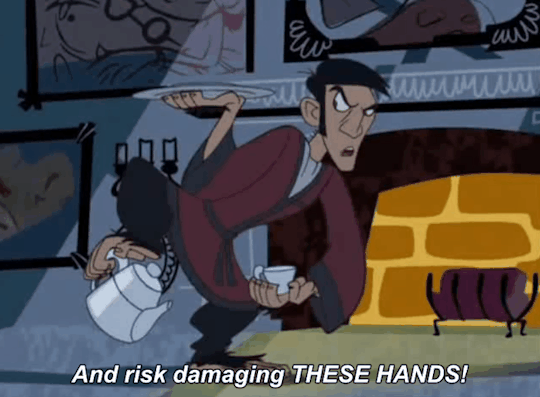
And look, if the reason you want to give them robot toes is because you have a thing for feet... why did you make them a foot amputee, of all disabilities lol? Odd choices aside, if that's the reason, just be honest about it, because why else is it always "sexy cyborg" type characters that have them?
Joking aside, the goal of a prosthetic is not (usually) to look as similar to "the real thing" as possible, it's to improve mobility. As such, sometimes the best solution will not be what looks the most "normal with a robot aesthetic twist". In the event looking like the real thing is the main goal, we already have the tech for that. Many prosthetics have silicone covers that look so realistic you wouldn't be able to tell unless you can see the top of the socket (where the artificial limb meets the real thing) and you don't have to give up much mobility or functionality to use them, since that carbon fibre sheet I mention just gets hidden inside the cover.
Signed an amputee who finds your pudgy little foot fingers unsettling and wishes people would stop giving robot ones to characters unnecessarily for the sake of making something that looks "normal".
[ID: an animated gif of a character from Kim Possible in a red dressing gown, using his hand-like feet to pour himself some tea. he places the tea pot down and it focuses on his hands, in a close up. the caption reads "and risk damaging these hands?" /end ID]
#only half joking#scifi#disability#disabled#amputee representation#amputee#physically disabled#physical disability#writing community#writing advice#on writing#writing#writeblr#writing disability#designing disabled characters#disabled artist#drawing disability#artists#art advice#creative writing#writers of tumblr#authors on tumblr#character design#design#disability in character design
862 notes
·
View notes
Text
// HSR LEAKS
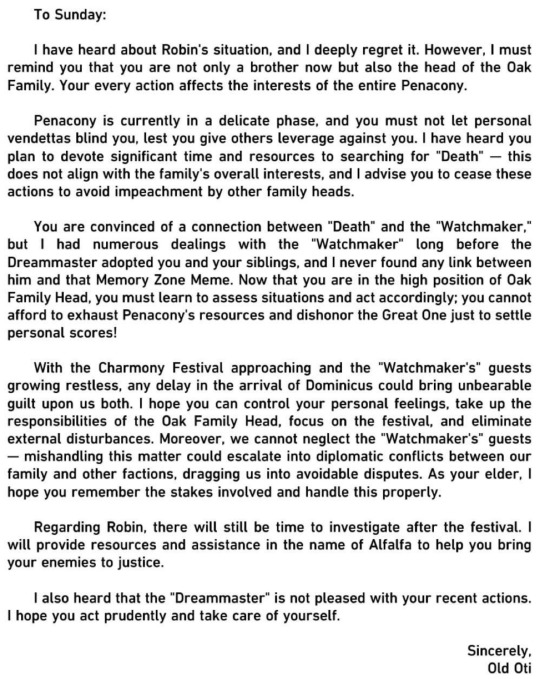

Some letters sent to Sunday… interesting things that I’ve noted:
The Oak Family leader can be impeached by the other Family Heads.
Sunday has more siblings? Or had. Maybe Oti didn’t mean siblings in the literal sense… but we can’t be sure. I wonder what happened to the rest of them..
Adding on to this ^^^: In Robin’s letter, she says, “You are the only family I have left.” So maybe there really were more siblings than just Sunday and Robin.
Sunday and his siblings were adopted by someone called the Dreammaster. So this answers my question about wether or not Sunday and Robin were raised via congregate care. But then this also raises the question of where Halovians come from. Are they born through natural copulation? Are they asexually reproduced?? Etc. I’m also curious about who exactly the Dreammaster is.
Sunday has been executing personal investigations regarding Robin’s death. He must be absolutely distraught and desperate for answers.
The Family is definitely a group with a toxic environment. It’s clear that they value image and function using a collectivist mindset. The Family has just lost an Emanator of Harmony and they still refuse to deviate from their main goal. They won’t even allow Sunday to become sidetracked by it. And it’s harder for Sunday because Robin was more than just an emanator; she was his sister. But he can’t act on his grief, and we watch him contain himself for the sake of The Family at the end of the first Penacony quest.
There is a traitor in The Family. They are trying to ruin the Charmony Festival, but why? What are they trying to achieve? (I’ve seen some theories that the Charmony Festival this time around is supposed to brainwash all the guests. We’ll just have to see.)
In Robin’s letter she asks Sunday to stay in dreams less and to walk in reality more. He’s probably always on the job/a bit of a workaholic. She also says, “… but please also ensure your own safety. You are the only family I have left.” This makes me wonder if Sunday and Robin’s other siblings were lost through nefarious means.
Robin sends Sunday a lot of sweets. Does he have a sweet tooth?
Who is Dominicus? One of the harmonic strings; aspects of Xipe and most likely emanators. There are four of them:
Aelenev — The Commander of the Eternal Centurion
Dominicus — The Wisher of the Harmonious Choir
Constantina — The Singer of the Panacoustic Theater
Beatriz — The Merrymaker of the Blissful Ball
It is also stated in the data bank that the harmonic strings can assume any members of the family and are facets of Xipe. So it’s possible that Robin is some sort of manifestation of Constantina, and perhaps Sunday is some sort of manifestation of Dominicus (Dominicus in Latin is Sunday. There was a theory going around that Sunday is Dominicus. But these letters debunk it.) OR… maybe Dominicus will use Sunday as a vessel/temporarily possess him. (Could this be Boss Sunday???)
There’s a lot to think about.
230 notes
·
View notes
Text
The interconnected story of Prospera, Suletta, and Miorine: An analysis of Prospera’s role within the story of G-Witch
Happy Suletta Sunday! In this installment of my now series of analysis on the romance of G-Witch I’m going over Prospera's role in G-Witch, particularly as it relates to Suletta and Miorine. As always thank you for reading and I hope you enjoy it.
Prospera is arguably the character in G-Witch who has the biggest effect on Miorine and Suletta throughout the story. She's also a Faustian bargain of a character arising from attempting to combine a Char-clone with a romance antagonist. These two narrative roles have some overlapping but mostly different requirements. Like all antagonists, they need to make life harder for at least one main character but also have narrative functions that are unique to them.
The most significant difference between the main antagonist of a romance and any other type of antagonist is that their primary function is to provoke the main characters’ central insecurities. After all, when it comes to the main characters of a romance, their darkest hour has to be self-inflicted. In this regard, the way Prospera is the main reason for Suletta's central insecurity and gets Miorine’s to flare up like crazy while never doing anything to tear them apart and even being responsible for the two of them meeting is immaculate. Suletta and Miorine's insecurities are the only thing causing a rift in their relationship; that's romance at its best.
Then there's the Char-clone aspect of Prospera’s character. She's mostly comprised of characteristics of the Char from Mobile Suit Gundam: Char's Counterattack. A self-righteous manipulator who’s willing to do some morally dubious acts to achieve their goal. Side note: Although it could be argued that some characters in G-Witch have elements of a young Char, none neatly fits into the role of Suletta’s rival. At least not if someone is to go with the dictionary definition of rival. No one wants to outdo her for the sake of it. Neither do they want something she has as she doesn’t have the political standing for her position as the Holder to do much, and the thing she does have is the adoration of a self-reliant Miorine, something no one else wants. Suletta is the only one who’s interested in Miorine because of her headstrong personality instead of despite it.
The type of Char-clone that she is, along with being the main antagonist in a romance, means that her role in the story is to be a master manipulator who, through her manipulations, makes the main characters’ insecurities act up. It’s imperative that she’s not the direct cause of the rift in the heroines of the story’s relationship; otherwise, it wouldn't be a romance. Prospera only has the power over Suletta and Miorine that she does because they let her.
In order for the main characters’ insecurities to be passively provoked, those insecurities have to correspond to what the main antagonist is about. In the case of G-Witch, Suletta is overly reliant on her mother to the point Prospera consistently is the person Suletta goes to for emotional comfort. This only makes things worse for Suletta as Prospera keeps telling her that as long as Suletta listens to her mother, everything will be alright, which maintains Suletta’s dependency on her and instills the idea that she only deserves affection if Suletta does as she’s told. Prospera can take most of, if not all, the credit for Suletta taking the blame for Miorine breaking up with her because Suletta couldn’t be of more use to her. She’s been taught to see herself as an asset for her loved one instead of someone who can and should receive affection without needing to earn it.
Meanwhile, Miorine starts to antagonize Prospera from the moment she discovers how much influence she has over Suletta. Miorine’s fear of how much control Prospera has over Suletta becomes the reason Miorine breaks things off with Suletta. Her desire to make her own decisions extends to Miorine wanting the same for her loved ones, which puts her at odds with Prospera. They have conflicting views on how Suletta deserves to be treated. This is made all the better by Prospera acting caring while using Suletta, while Miorine cares deeply about Suletta while initially pretending to use her.
The most important elements that make up Prospera, Miorine, and Suletta’s three-way dynamic are their roles in the story, their characterization, and their motives. To simplify things regarding how they interact with each other specifically, those are as follows:
Suletta’s role: One out of two of the main characters in a romance.
Suletta’s characterization: Has a black and white morality and is a bit too willing to do what she’s told without question. Otherwise is loyal, protective, determinded, affectionate, easily excited, and loves doing acts of service. All in all has a personality not too dissimilar to a golden retriever.
Suletta’s motive: To be with the people she cares about most and keep the people she loves safe.
Miorine’s role: One out of two of the main characters in a romance.
Miorine’s characterization: Fairly deceptive, values independence to a fault, and doesn’t have the easiest time trusting others.
Miorine’s motive: Making sure she and the people she loves, particularly Suletta, don’t do something just because they’re told to.
Prospera’s role: The main antagonist of a romance.
Prospera’s characterization: Overbearing, manipulative, and controlling, especially towards minors.
Prospera’s motive: Doing everything in her power to get her daughter Ericht back and get revenge on those who took away her friends and family.
When it comes to which of these contributes the most to how their stories become intersected, it’s Prospera’s role and motive, Suletta’s characterization and motive, and Miorine’s role and characterization. The rest either is derived from or doesn’t affect that character’s dynamic with the other two. Suletta would have the same relationship with Prospera and Miorine at the start of the show, regardless of her being a romance protagonist. Prospera’s characterization stems from her role in the story. Miorine’s motive is dependent on her characterization and also her role, as without her feelings for Suletta, she would likely have the same amount of beef with Prospera as she has with Vim Jeturk. She clearly isn’t fond of him, but Miorine doesn’t tell him to stay away from Guel because he’s not one of her loved ones.
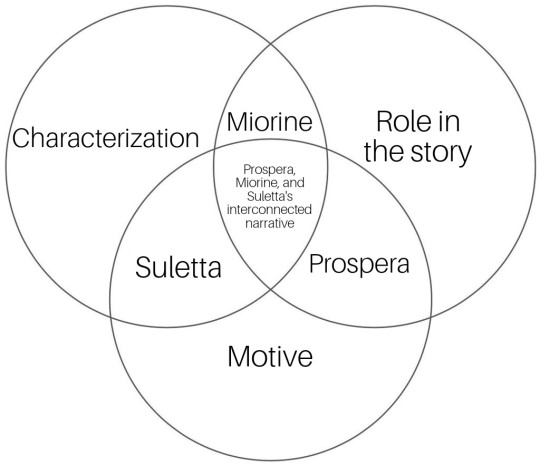
The way these three characters' story gets intertwined starts with Prospera creating a repli-child of Ericht that becomes Suletta to help enact her revenge for the incident at the Vanadis Institute. Skip forward seventeen years where Miorine and Suletta cross path. Then, through Suletta being Suletta, she unwittingly gets the two of them involved. Through her relationship with Suletta, Miorine becomes acquainted with Prospera and learns about the influence she has over her daughter. Miorine, being who she is, of course, is having none of it and villianizes Prospera to the point of only making things worse for herself, which in turn solidifies Prospera’s role in the story. Lastly, learning just how far Suletta can go in order to keep her loved ones safe is what sends Miorine spiraling as she blames Prospera for the things Suletta did.
Prospera, Suletta, and Miorine’s narratives are extremely interconnected, which, for the most part, is a good thing. Having an interpersonal conflict that’s born from conflicting personalities and goals is gonna feel more natural and less contrived than a more situational conflict. It does, though, also mean that if someone wanted to change something in the story of G-Witch that involves these three without changing any other aspect of the characters or story, it’s going to be a bit of a pain. To complicate things further, this already applies when only focusing on Suletta, Miorine, and Prospera’s fundamental dynamic, but these three are a lot more intertwined than that. Each of their roles, characterization, and motive affects at least one other of either their own or one of the others and sometimes both.

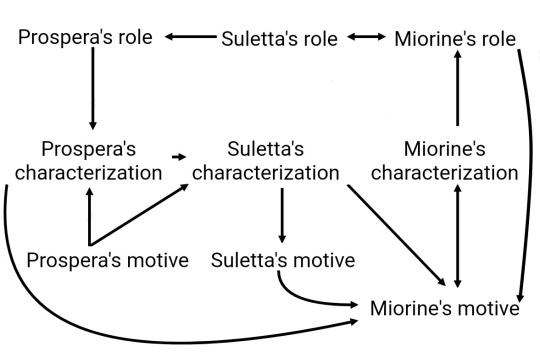
Now, to break this down. Starting with Miorine’s motive, if she’s not set on preventing Suletta from doing something just because her mother told her to, that would affect her characterization. If there’s any other reason she wants to keep Suletta away from Prospera, like actual mind control, that’s going to take away her fundamental insecurity. She needs to be wrong about the level of influence Prospera has over Suletta; otherwise, she isn’t being blinded by her insecurities she would just be right. This makes her a lot less flawed as it presents her deceptiveness as a purely good thing instead of something that every so often turns into mild paranoia. Furthermore, if Miorine either doesn’t have any central insecurity or it doesn’t have anything to do with the rift between her and Suletta, the story ceases to be a romance, which in turn affects all three characters’ roles within the story.
Then there’s Prospera’s characterization, which is directly caused by her lust for vengeance and messes with the minds of both Suletta and Miorine, which is what makes her an effective romance antagonist. Without losing her friends and family, then most significantly, Suletta just wouldn’t exist, and Prospera wouldn’t have treated Suletta the way she did. This, in turn, would change some aspects of Suletta, that is, if she even existed and wouldn’t get Miorine’s, wouldn’t central insecurity get out of control, affecting her motive.
Lastly, there’s Suletta’s characterization. If she was any less unassuming Miorine’s central insecurity wouldn’t be acting up as Suletta wouldn’t do what her mother told her to with question. Also, if Suletta had a more nuanced morality than she does, she wouldn’t have been so unfazed by what she did at Quetta, which leads Miorine to think Prospera has a lot more control over Suletta than Prospera does. Suletta has been taught to think that her mother is always right, so if Prospera tells her that killing someone to keep other people safe is morally correct, she won’t see a problem with turning a guy into meat sauce. Prospera hasn’t allowed Suletta to develop a complex view of morality, which is a lot more messed up than if Suletta was some kind of sleeper agent or the like. Suletta’s unnerving in the same way a young child firing a gun without realizing that people could get hurt is. She is to blame for her actions, but the way she reacts to them is childlike, which showcases the way in which innocence can be terrifying. Suletta being a cinnamon roll doesn't crash with her willingness to kill someone it's why she's fine with it.
So there you have it. Why a character does something changes depending on the situation they do those actions in. This doesn't necessarily have to be a big deal as it mostly affects implications. If the circumstances change but the characters act the same, it can create some narrative dissonance.
#mobile suit gundam the witch from mercury#the witch from mercury#g witch#prospera mercury#suletta mercury#miorine rembran#suletta x miorine#sulemio#posted this on 12 pm UTC to have it actually be sunday for the most amount of people
85 notes
·
View notes
Text
On (soccer) partnerships, commitment, and why Nagi and Reo are the poster children for always doing the opposite of what the series is about
Alright fellas, this started out as something completely different, so forgive me in advance if it feels disjointed, but.
Have you wondered why in chapter 18 of epinagi, Nagi’s inner monologue complains that his “heat is being stolen away”? Or why even in the main series Nagi can’t seem to win a single match even after he and Reo get on better terms? Well, if you have, this post might be a fun read for you. If you already have answers, I might sound like I’m stating the obvious because none of this is particularly subtle or particularly new. But since both series have hit the Nagi Flop Era, I thought it’d be fun to take a deep dive into his character and Reo’s, the themes of the story, and how their codependence contradicts the entire premise of blue lock, intentionally so. I’m going to go over why stagnancy is the entire point of their partnership, and why the fact that they keep failing and failing is instrumental to the type of story Kaneshiro is trying to tell.
So, without further ado. Get comfortable, this will get long.
So, as I anticipated, Nagi and Reo are very very often written to be at odds with the themes the story functions around, and I think their regression is another instance of that. In a manga that often underlines the importance of making soccer your “reason to exist” if you’re serious about it, Nagi and Reo are the only duo repeatedly singled out as more committed to each other than to the sport itself. This, the story tells us, being the root of why they so often fail.
The premise of blue lock is that you can’t become the best in the world until you dedicate your whole self to the sport. Only that egoism will push you in the right state of mind to go above and beyond for a victory.
Time and time again, we see the most outstanding goals happen in what gets called the hottest place in the field. This “center of heat” comes up a couple of times, and it’s usually represented by a person. According to Ego’s philosophy, the idea is that the world’s best striker possesses a soccer-specific kind of charisma. When he enters a state of flow and pulls off a world-class play, he’ll have a ripple effect on the players around him, pushing them to reach flow too and elevating the level of the game itself. We saw this happening in the U-20 match. Ego’s not really aiming to create a national team, or to foster the talent of the new generation. He only cares about nurturing one person into that role, betting it all on the fact that once that striker awakens from its “rough diamond” shell, they will fire up their teammates & lead Japan to victory.
Because of this, ideally, everyone aiming at becoming the world’s best striker should strive to be that center of heat. To an extent, even Nagi does. His motivation is spotty at best, but whenever a game heats up, Nagi’s ego gets tickled awake the same as everyone else’s. This is not limited to the times Isagi challenged him, by the way. He reacted to Rin’s skill in much the same way.
Problem is, neither Nagi nor Reo seem to know how to become that center of heat by themselves. They only react to someone else raising the stakes of a match. Even when Nagi feels fired up, his lack of creativity & playmaking sense fail him against any opponent who is more tactical than him. In a similar way, even when Reo starts going after goals alone in the wake of his split from Nagi, he still can't see his vision of a goal through to the end, or gets outsmarted and beaten to the punch by other playmakers.
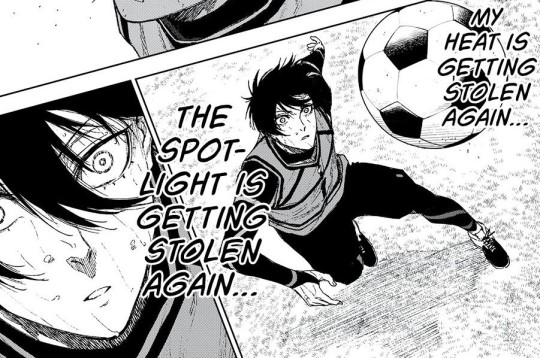
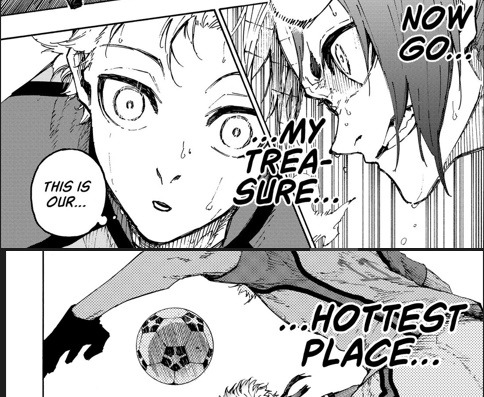
The only times they really get their head into a game is when they're working as a duo. Compare for example Nagi losing grasp of his heated frenzy when he splits from Reo to how quickly he reaches flow when they go back to playing together.
So why is this an issue? If Nagi's limit is his over-reliance on instinct, and Reo's is the lack of self-centeredness that's key to scoring, then shouldn't teaming up solve the problem and make them a powerhouse? How come, even after somewhat resolving their communication issues, their soccer still is no match to that of the blue lock elites?
Well, before I can begin to unpack the answer to that… A big theme driving the soccer partnerships is that you won’t go very far if you rely too much on the other person to carry your weight. This is the reality Bachira faces in the 4v4, when he “disappears”, swallowed by everyone else’s growth. This is also the lesson Rin learns from Sae when his brother returns from Spain a completely different, overwhelmingly superior player. The series tells us that relying on others to pick up your slack makes you less sharp and prone to noticing your weaknesses because someone else will cover your back.
For a practical example of this, Rin's style when he played with Sae mirrors Nagi's around Reo: they both relied on instinct, trusting that the ball would always come if they just positioned themselves in the right spot to score. And for a time, it did. But that's not the level the rest of the world plays at. Nagi and Reo's winning streak ends when they face an unpredictable, explosive talent like Isagi, who doesn't operate according to any predictable patterns. Similarly, Rin's playstyle gets wrecked in a matter of minutes by a Sae who got to experience the "real" soccer played overseas.

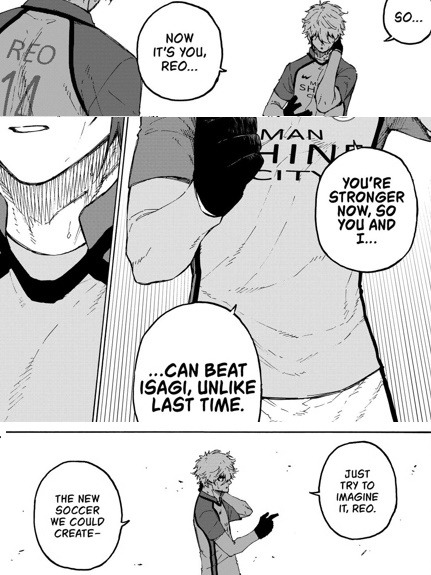
The point, then, is that Nagi and Reo never really assimilated any of Ego's lessons, instead resisting his philosophy to a fault by choosing each other. From the start, they’re not very good at being apart, given how their strength draws from being a team. Both of them are noted to only ever increase the level of their plays when they are working together, but not as much when alone.
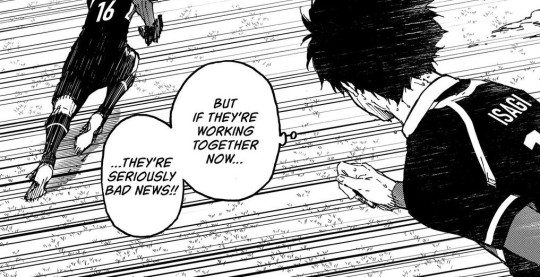
Nagi’s the brawn to complete Reo’s brain, and their dynamic too often falls back on that codependent partnership. In fact, they default to their roles even when they're not playing with each other. During the second selection, Nagi replaces Reo with Isagi, continuing to rely on someone else's creativity and game sense, while he just follows. And in the 3v3, we similarly see Reo fall back on playing the midfielder to Kunigami and Chigiri's forward, offering up the perfect passes to make them shine and get all the scoring options they want.
But what about when they're together? Aren't they strong then? Didn't Nagi score a crazy super goal thanks to Reo's assist? What do we make of that?
You'll probably remember how Ego got a sense of foreboding from Nagi's five shot revolver. Of course, you might say, Ego never liked their soccer! He was cussing them out for playing together since day one! Of course he's a hater!
Well… Yeah. But Ego's also an authorial insert, and he's there to tell us the themes of the story, and comment on the characters growth. Or in this case, their stagnancy. Nagi's returning to his reliance on Reo's brains and Reo's willingness to entertain it are both framed as a bad thing because it specifically contradicts the idea the series is based on: that a real striker is an egotistic, self-reliant existence that doesn't bend to other people's rules, but instead dictates their own, and makes everyone follow or fall through in their wake.
There are several players this definition already applies to. Rin, Barou, Shidou and of course Isagi all come to mind. Isagi's growth in particular has been rotating around this concept. Isagi not only believes in his (meta) vision, but he also possesses the sharp-wit and the cutthroat resourcefulness to see it through no matter the odds, at times even to the detriment of his teammates. Nagi and Reo, on the other hand, can pull off some incredible plays, but it’s never enough to land them a solid victory, especially in the NEL arc. Usually, in a story, when a character fails enough times to become stagnant, the author is making some kind of point. In this case, as the narrative itself points out through Isagi first and Agi later, it’s the concept that relying on their teamwork is actually making Nagi and Reo’s soccer worse.
Sure, Nagi might've caught Isagi off guard with those feints once and managed to score, but that's still him relying on instinct over brains. If you dissect that match, you'll see that aside from the fake volley itself, which is the product of a non-replicable state of flow, there isn't a single move Nagi and Reo made during that game that Isagi didn't see through, expect, and match their pace at. This is by design, of course. It's meant to indicate that while Isagi grew, learning from stronger players and assimilating new elements in his arsenal of weapons, Nagi and Reo are still stuck playing the same way they did in the second selection. With Reo as the heart, brain and anchor directing Nagi around, and Nagi as the leg kicking the ball into the net following a momentary burst of inspiration.
The fact that this is intended as a setback in their path towards a more egotistical soccer is made more obvious by the timing. It's not a coincidence that Nagi went back to Reo the moment he got frustrated by how hard creativity and tactics come to him when he's on his own, without a "handler" like Reo (and later Isagi) taking care of all the hard parts.
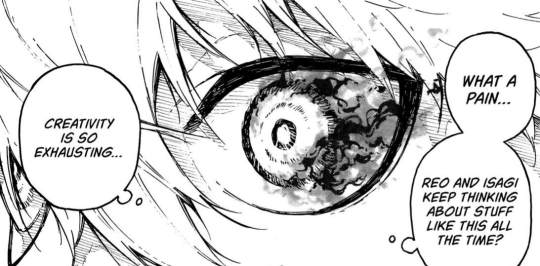
Nor is it a coincidence that Reo was faced with the choice to go back to helping Nagi out right when Reo was beginning to go after his own goals, without help. Nagi comes up to him and shakes him up literally one (1) panel after Reo's dramatic, resolute decision to prove himself alone.

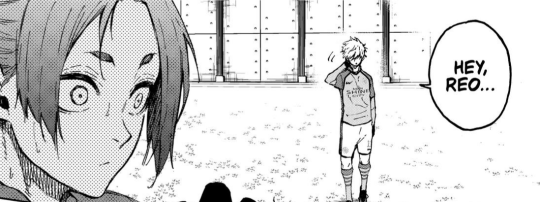
Had they gotten anywhere in their quest to polish their individual skills during the split, maybe their partnership could’ve aspired to become more like Isagi and Bachira’s, eventually. However, they weren’t apart long enough to master their respective strengths, or to consolidate their egos as something separate from their status as partners. Thus, when they resume playing together, they instead hold each other back.
So is their ego the problem here, then? Ever since that five shot fake volley, we see Nagi’s dissolve, leaving him unmotivated again, grasping for answers he can't seem to reach no matter how many people he asks. And surely, its disappearance is significant, much like how Reo's ever changing definition of his own ego is also significant. But I think the real issue is something else. Egos can take many forms, and Nagi and Reo aren't the only players whose so-called “protagonism” isn’t rooting for their own success. Most recently, Hiori gained an ego too, and it was framed as a good thing even though it doesn’t strictly lead to him becoming the best striker in the world.
My idea, then, is that it's less that they lack the "correct" ego, but more like they lack the correct attitude towards soccer to begin with. From the start, they're both motivated by something that is not inherent to soccer itself, but only tangential to it: the World Cup—or rather, their promise to each other that they'd win the World Cup. Because of this, I think, they center their football more around their partnership & their shared dream than any genuine passion for the sport, unlike pretty much the rest of the cast (now including Hiori. Yay!). In other words, the problem is that neither of their egos is really about themselves, yet. So it fails them because it's not conductive to "protagonism", but centered around an "us" that drags them off course.
Let's go with Nagi first. On the surface, "commitment" and "Nagi Seishirou" don't seem to go well in the same sentence. Nagi doesn't do anything excessively. He's content to coast through life doing nothing more than he strictly needs to survive. As long as he can put in minimal effort and still have time to play video games and nap, he's happy. When his teachers asked him to fill a form about his future, he couldn't think of anything he wanted to do. He's the embodiment of living one day at a time cause it's too much work to figure out his life past that. Yet, he genuinely commits to soccer.
Or does he?
Sure, he agrees to not only playing the sport, but to dedicating several years of his life to becoming pro. That’s dedication, for sure. But is it really for soccer? I would argue that no, Nagi’s commitment is to his partnership with Reo, not to the sport itself. And okay, you can’t have one without the other, but the distinction is important to understand Nagi’s (and Reo’s as well) resistance to character growth.
So, Nagi had no passion for the sport until he saw the level some other elite blue lockers played at, and got curious and frustrated enough to put real effort in it himself. But until then, soccer was simply something he tagged along in. In fact, he was pretty unenthused with the idea of playing until Reo promised him an easy life and made it so Nagi wouldn’t have to work hard for it. Nagi signs up for blue lock with the expectation that he’ll be the one to flunk out first, without being too torn up about it. Clearly, it’s not a career as a professional soccer player he has an attachment to. I’d argue it’s more the fact that he feels comfortable around Reo, and he is invested in what only their agreement can bring forth. That is, a life more exciting than any nap or game.

The excitement part is the focus here. At their core, both Nagi and Reo’s characters are motivated by the wish to escape boredom. So much so, the epinagi movie made that its tagline. Thematically, dissatisfaction with boredom is the catalyst for every choice they make. While everyone else is motivated by an ambition that is inherent—that draws from their wish to excel—Nagi and Reo are more prize-oriented, lacking the conviction that they’re special on their own. It follows that the challenge of bringing home the World Cup represents just that—for Nagi, it’s the thrill of a final boss with the prospect of an easy life afterwards, and for Reo, something hard to obtain that he’d conquer by his own merit. In both cases, soccer for soccer’s sake is not the end goal. It’s just a tool to achieve what they really want.
Neither of them ever really dreams of becoming the world’s best striker, and neither swears their entire life to soccer, either. Not even Reo ever brought up a career in the sport, past winning for Japan for the first time. This is why I say their commitment is more to each other than to football, and also why they struggle to advance in the program.
Let's think about it. The Cup was never really Nagi's dream; beating Isagi was. Yet, when their partnership all but crumbles down, Nagi keeps making choices with the Cup in mind. The boy who never fought for anything becomes determined to honor his promise to Reo even if he's not certain that Reo still cares about it. By his own admission, he chooses Isagi and then England because both of those things bring him closer to their original goal, and Nagi's resolve for that has never waned, even if for a time he thought Reo's had.
It's like he clings to inertia to avoid thinking what the sport means to him. Despite how Reo seemingly turned his back on him, Nagi doesn't want to give up on what made them partners. To him, soccer never stopped being something they shared (to a fault). That's why, I think, when they make up, a big part of their reconciliation is going back to sharing a dream. This time, with Reo helping Nagi out instead of the other way around. And I'm saying that's a flaw because his subconscious need to seek answers and help from others made it so that whenever he's alone, he doesn't have a very defined idea of how to move forward. But again, a striker should be self-reliant, and have the capacity to evolve on his own even as the match is unfolding. But Nagi didn't even believe in himself until Reo convinced him he was special, so how can Nagi have the right mindset to seize his protagonism?
Similarly, Reo’s drive is also not based on anything inherent. From the start, he doesn’t believe he was “chosen by football” the way geniuses like Nagi and Rin are. Because of this, he never bought into Ego’s striker philosophy, nor has he been a very fitting candidate for it yet. Much like with Nagi, his set up as someone willing to step away from the spotlight positions him in defiance of the story’s themes. While Nagi has the talent and instinct to become a powerhouse but lacks conviction, Reo is a born leader outside of the facility, but within blue lock’s rules he can only make it to the U-20 bench, and so far no further.
The point here is that Reo’s readiness to be Nagi’s crutch is lowkey framed as a voluntary burden he places on his potential growth, a fact that the narrative condemns.
Reo was born for success—bred and raised with every luxury to make sure he'd step into his father's shoes and be one of Japan's wealthiest and most capable businessmen. And Reo takes obvious pride in his social status, too. We can see it in the flaunted wealth of his spending and daily habits, as well as in the way he interacts with his peers. He funds his Hakuho soccer team and easily seizes captainship. Blue lock teams don't have captains, but he still rises to a similar position even within an environment designated to promote violent competitiveness and a wolf-eat-wolf mentality. Heck, he asks Nagi to call him "boss" and demands Zantetsu recognizes him as "super elite". Pride in being the best and excelling at everything he does is written into Reo's code.
Yet, the moment Ego suggests that there is no such thing as cooperation within his training program, Reo is quick to bargain—take him, he’s the real star. I will tag along and ensure his success.
Ever the businessman, right? Problem is, renouncing his pride for someone else is the opposite of the attitude he should have. Same as Nagi, Reo puts a lot of weight on their shared dream. Too much weight. Somewhere along the line, “I want the World Cup” became “If Nagi’s at my side, we will win the World Cup”. Being partners until the end became so entangled with Reo’s dream that he can no longer separate the two. When Nagi leaves, Reo’s image of that finishing line crumbles. Iirc, he doesn’t even mention the World Cup as his goal anymore until Nagi comes back to him. When asked to put into words what he wants to achieve with his soccer, Reo tells Chris that he wants to go after goals alone. It’s only later, when Chris questions what happened to his solitary resolve in the wake of Reo’s restored friendship with Nagi, that Reo is like “well, my actual dream was the World Cup anyway, so this still counts.���
That is both true and a deflection from the truth. Yes, Reo’s real goal has always been the cup… but he also subconsciously sees it as something inseparable from his promise with Nagi. He can’t have one without the other. Or he thinks he can’t, is the point. Partly because of that, and partly because Nagi is his best friend, Reo is very resistant to Agi’s criticism. The story’s trying to nudge Reo towards personal growth, telling him that the only way out of this impasse is to quit what isn’t working. However, because Reo’s meant to resist the themes of the story, the choices he makes are rarely the right ones. That is, the choices a real egoist would make in his place.
This isn’t anything recent, by the way. For this same reason, for example, winning Nagi's trust back becomes his main motivation to survive past the loss in the 3v3. By his own admission, Reo is the only guy in blue lock who not only has a safety net outside the program, but a very comfortable life to fall back on if a career in football doesn't work out for him. But when push comes to shove and he faces the chance of dropping out, Reo resolves to improve by thinking of Nagi and their shared dream.
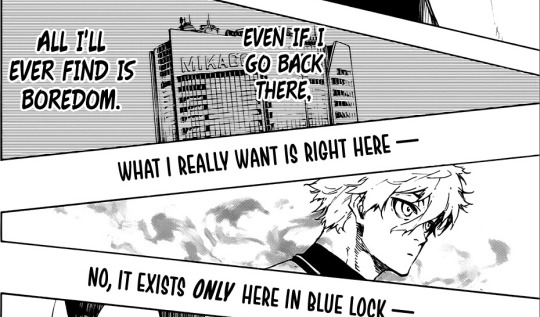
Let’s compare that to Barou, who was similarly broken down and had to crawl his way up again. Barou goes the egoist way and finds his resolve within himself, vowing to double down on his king shtick and devour Isagi back. To Barou, the simple idea of passing a ball is akin to defeat. When he envisions a future of normalcy, with football as something to only watch on tv, Barou’s hunger to reign the field like a king rears its head again and motivates him forward. Reo, instead, never reaches a point where he embraces the series’ trademark selfishness. In fact, he does the opposite. When he vows to step up his game, he doesn’t do it because he thinks he’s the top dog like everyone else. The root of his despair is not a wounded pride, or a desire to prove himself further, to “devour” others back and rise to the top, but just the loss of his fix against boredom. Remember, chasing an exciting life is both Reo and Nagi’s main motivator so far. To put it simply, Reo doesn’t want what awaits him outside of blue lock.
That’s the seed of his actual ego, by the way. Not the Cup, not making Nagi the best, but rather obtaining something by his own merit. But because of his reliance on Nagi (and Nagi’s on his), Reo hasn’t yet reached the point where he can realize this and use the knowledge to better his plays. In that sense, their partnership holds both of them back from exploring their inner motivations and individual strengths further.
And I said that this is instrumental to the kind of story Kaneshiro’s telling because it’s meant to show us all the ways a striker can’t be. This is not a manga where the power of friendship will get you anywhere. No matter how stubborn you get about having it your way, obstacles will materialize in your path and set you back the longer you refuse to play for your own sake.
Yet, Reo doesn't want to advance in the program for the sake of becoming the world's best striker. He never did. He wants to move forward because Nagi left first, and he wants to meet him on the other side (quote, "beyond our dreams"). In other words, to return to being friends, even if he fears that Nagi might've replaced him with Isagi and "forgotten" about him. It doesn't have anything to do with soccer per se. It's more like Reo sees soccer as his chosen tool for self-determination. It was the trial to prove to himself, as well as his father, that his "worth" wasn't handed down to him by circumstance, but was inherent. He could achieve something worthwhile thanks to hard work, and not just reap the benefits of his last name.
And the thing is…If he were literally anyone else, at this point he would’ve already channeled that into individualism, but because it’s Reo, he doesn’t. Despite possessing that seed of egoism, Reo doesn’t water it. His ambition doesn't make him an egoist in the way Ego Jinpachi intended, but instead becomes something that's meant to be carried by two people, contradicting the story.
Reo’s resolve is then always a bit off from falling in line with the rules of blue lock. Even when he gets something right, he does it for the wrong reasons, stumping his development. For example, his resolve after the 3v3 is both a step forward and two steps back. The positive is that he "engraved despair". He faced his shortcomings, realized his powerlessness, and took measures to improve to avoid being left in the dust again. The negative part is that being on his own should've given Reo a taste for real egoism, a hunger for self-reliance, but it does the opposite instead: it makes him long for what he had, and put all his willpower into restoring that partnership however he can. If the issue was that Nagi's improved enough to no longer be satisfied by the level of Reo's plays, then Reo's solution is to make his soccer exciting again in Nagi's eyes to, quote, "be enough to satisfy" him.

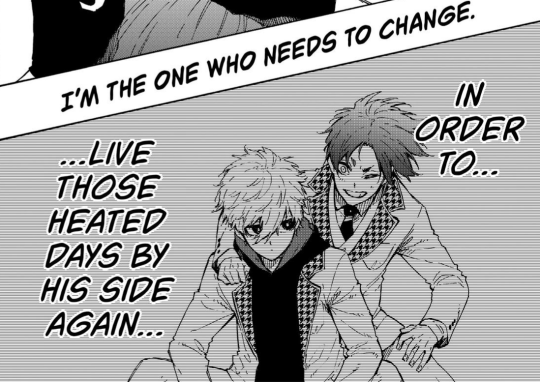
Because of that, however, the moment he has Nagi's trust back, their partnership back, Reo pretty much stops trying to improve. His chameleon style is still a go, but it becomes yet another tool to assist in Nagi's goals. It didn't start that way.
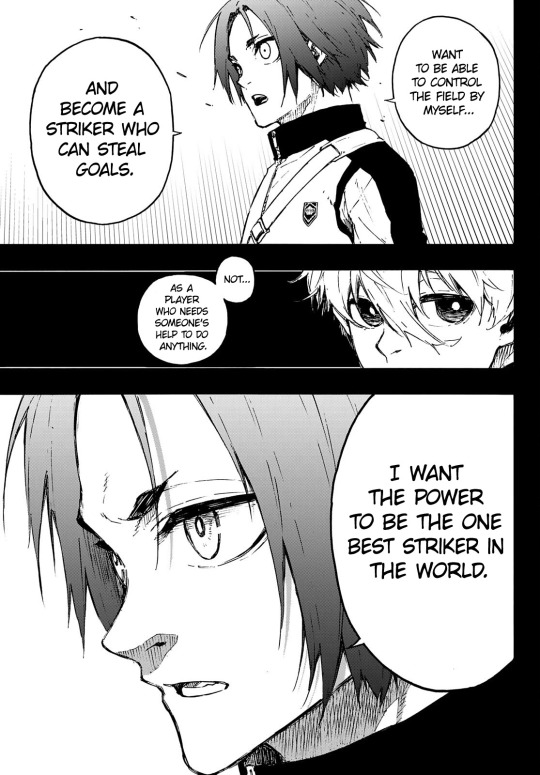
Initially, it was what Reo intended to use to score alone, remember?
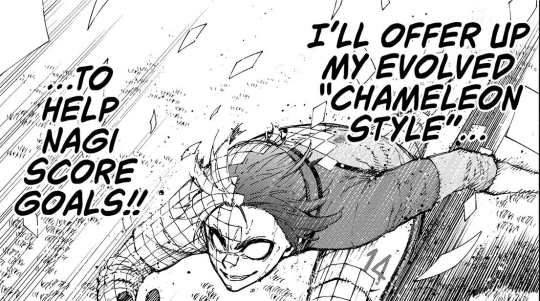
Yet, even after coming up with a style that's solely his, that focuses on his strengths and brings no value to Nagi's, Reo keeps committing to stagnancy. In different but similar ways, both do.
Teamwork and passive codependence are the two things Ego asked all the blue lockers to leave behind, but Nagi and Reo make it their job to bring typical shonen manga dynamics into a series that sets out to break from the norm. And that’s the point!
In this sense, Reo is more at fault than Nagi, who instead realizes that sometimes being apart makes you better, and doesn’t mean the end of your friendship. If I were to pin down Nagi’s role in the narrative, then I’d say he’s meant to show that talent doesn’t equal success without discipline, self-awareness and determination. So the world’s best striker can’t just be good. He needs to know what he’s doing, and when and where he can do it to make the most of every play, since nothing happens by chance on the field. Whereas Reo’s role is that of showing us the mindset of a real striker. Because Reo enters the program without accepting or even understanding Ego’s rules, Reo’s faulty beliefs get challenged at every turn, with the author basically spoonfeeding us the correct path to soccer stardom.
So in the end, since they struggle so much to even understand what they should be doing, their fumbling around makes it so the story goes more into depth about its own themes. Their job is to be incompetent, basically, but in a way that doesn’t rule out eventual growth. They just need to come to terms with the rules of the competition they entered first. So far, they’ve been content to just live in a bubble and coast through the increased stakes of the selection. If they’re serious about their dreams, however (and we’ve established that they are!), they will have to make a choice between what’s comfortable and what’s necessary. Cause, to quote Ego from epinagi chapter 2, in blue lock there’s no place for self-conscious babies who don’t want to ever get their feelings hurt.
So what will they choose? Each other again, or the only way they can make it past blue lock and thus actually chase their dreams?
#Blue lock#Blue lock spoilers#Nagi seishirou#Mikage reo#Seishiro nagi#Reo mikage#Bllk thoughts#And here it is! Sorry for the wall of text. I might go back on this and add more pictures later but rn I'm toast#I need to get this out or else I'll add 4k more lol#I am very normal about those two yes#Nagireo#Reonagi
141 notes
·
View notes
Text
remus isn't dumb; a sanders sides essay
i've been struggling to make a cohesive post about this because i feel like most of what i want to say boils down to the same underlying message which is: remus isn't dumb.
i feel like a good chunk of this fandom understands what i mean, at least to a surface level point. but even then, i think too much of the fandom still misinterprets remus' character in a way that, they seem to understand different traits of his, but the way they execute it is still way off from what we see in canon.
(rest of the essay under the cut!)
for example, the biggest thing i see people get wrong would be the way they write remus "lol random" personality. it's true that remus tends to say whatever he wants at any given moment. but, the problem here is that people tend to think remus as random in function. i have no better way to describe this succinctly, so to expound: while remus tends to make left-field jokes a lot, he is shown to be incredibly deliberate, cunning, committed, and intelligent in very subtle ways.
truth is, remus is very goal-oriented, and when he has a goal, oh he strives for that goal. so far, i'm writing this with the last 5 years episode being the most recent substantial episode, so i can't really 100% say all my assumptions of remus are true. actually, i think the upcoming season finale will be the missing link when it comes to providing us with the whole picture of who remus is.
as for now, i just have to stick with my theory of; remus, as a side of thomas' heavily connected to insecurities and mental health issues, intends to shed light on the "darker" sides of thomas because he believes them to be beneficial. throughout dwit, we see remus continuously bolster the idea that his contributions are useful for thomas. this continues in wtit, but with the extra layer of remus wanting logan as well to be in touch with the darker parts of himself to get thomas in line.
it is also heavily implied that remus is well in on whatever janus' plan is to get thomas to be a.) more aware of his mental health issues, and b.) to get thomas to break out of his catholic black and white thinking. in forbidden fruit, it's janus who’s seen permitting remus to present himself to thomas. bigger evidence though, as i've mentioned in the previous paragraph, is the way remus seems to deliberately want logan to manifest his anger against thomas.
of course, we can always say that remus taunted logan "just for fun", but i feel like too much of what happened in wtit seem to point to remus having deeper reasons. for example, wtit exhibits how bad thomas' mental health is to the point that he gets irrationally angry at nico for not replying to his texts. this proves how thomas has been neglecting his mental health, and with the way patton, virgil, and roman held onto toxic selfless ideologies for the longest time, thomas would still, naturally, be lost on what to do. he would even seem to deny how bad things have gotten, especially with the way he acts like nothing bad is happening when he goes to his date with nico.
why am i emphasizing this? well, it's because something i find interesting about remus' character is how deeply cognizant he is of thomas' problems. what i mean by this is, no other side can call out thomas' issues more than remus can. i wrote an essay about this before if you want to check this out, but tldr: remus, as intrusive thoughts, is the most perceptive out of all the sides when it comes to calling out insecurities or problems. we see this come to fruition in wtit when all of the traps he laid out for thomas involved nico in some capacity.
while you can interpret his character as evil for preying on others’ insecurities, i think it's important to acknowledge that, in a sea of people who tend to refuse to talk about their issues, remus is the main guy who constantly brings them to the table. whether remus' intentions are good or not, there's no denying that remus' importance as a side lies in the fact that he serves as a mental health alarm clock for thomas. with the way none of the sides want to communicate with each other, we need someone like remus to cut the bullshit and say things as it is.
again, we don't really know if he wants to help thomas. but i would like to emphasize that, yes, remus is not dumb. he does not merely make lewd jokes and calls it a day. he has the long-term goal of making everyone talk about more "taboo" topics with each other, and this includes talking about personal grievances the sides tend to suppress or refuse to talk about. lewd jokes are just part of the process.
i think this goal of his is also incredibly visible with the way remus treated logan in wtit. wtit is my favorite sanders sides episode because there's just so much to analyze between remus and logan, but you can check my other essays in regards to that. the main thing i wanted to point out is that what remus says to logan in the end, "woowee logan, now you're speaking my language. but who do you really want to scream that at?", proves he is more deliberate and cunning than he seems.
a lovely bit of analysis my friend orb (@orbmanson7) provided is that remus didn't just pop up in wtit to intervene with thomas' plans. he was there to intervene with logan's. if you've seen my other essays, i've talked about how logan as a side has been dwindling in terms of self-confidence and assertion. this has left a big problem of thomas being more reliant on his emotions, making him ignore the suggestions given by logan that may help with thomas' mental health in the long run. this is not to villainize thomas' mental health crisis, btw. all i want to say is that, remus recognizes how logan's self-restriction is doing no good and deliberately wants to push logan to become more assertive and angry.
that is why he says logan is speaking his language. he wants logan to recognize the merit in the way remus grabs thomas' attention. he wants logan to be like him and cause more havoc. again, we never know how much remus genuinely wants to help thomas, but we know that remus wants everyone to be more exposed to "taboo" things, and this includes logan being more in touch with his angrier side.
besides that, i'd like to mention how, in general, remus tends to be very committed to his goals more than how the fandom typically portrays him? in dwit, remus' main goal was to disturb thomas and the other sides. it's kind of just an introduction to his character. we're not sure if it's part of a bigger plan he and janus devised to get thomas to take care of himself better, but it is a possibility. the only time he gets too random is when logan begins picking apart his arguments. there we see remus only results to super left-field, continuous off-tangent jokes when he's desperate or placed in a lose-lose situation.
another, in wtit, we see how remus understands how to make very long, complicated traps. i think it's a perfect encapsulation of his personality, actually! throughout the episode, we see him make these multilayered traps with a ton of props and preparation just so he can bother thomas with it. it shows that remus is actually less impulsive-oriented as he seems. he even created a schedule he showed to logan detailing everything he wanted to do that day. again, deliberate! he is deliberate and very smart!
other thing i'd like to harken back to is the idea that he's in cahoots with the other dark sides to execute some Big Plan to break thomas out of his black and white thinking. while we don't know how orange acts like yet, we're Very familiar with janus by this point and we can see how long-drawn janus' plan of acceptance is. he's, again, sorry to use the word so many times, very deliberate. i don't even think his plan ends with svs.r, because it does seem like remus is well in on this plan too. in the 5 years video, he also seems to know more than thomas on what else is to come for the future of sanders sides, which implies he has some plans up his sleeve that no one else knows about. like i said, janus has the goal to break thomas out of his black and white thinking. and so far from what we've seen from remus, he also wants the same!
an important factor of remus' character besides his deliberateness is his general need to subvert what "goodness" means. "good and bad are all made up nonsense," he sings in forbidden fruit. throughout dwit he continuously criticizes everything thomas thinks is good or acceptable. in the 5 years video, he argues about how there's no "correct way of sitting". i think this also proves how remus is important as a side because, while not every single one of his beliefs are morally acceptable, he is still able to pick morality apart in a way the other sides are unable to. also, i just think this proves his character as just. generally smart? he's able to pick apart the status quo and moral philosophies, of course he's smart.
just to pick up on a previous point, remus is scarily perceptive. i mentioned this earlier with how remus is able to pick logan apart, but i'd like to add onto it more since i think a lot of people underestimate how crazily perceptive he is. for one, despite not being too close with a bunch of the other sides, he seems to be able to read their insecurities and play them against them really well. we see it in the way he uses virgil's insecurities of being an ex-dark side against him. we see it in the way he picks on patton and thomas' morality crisis against them. we see it in the way roman describes remus as someone being able to show him things he doesn't like about himself. and most importantly, we see it in the way remus constantly reaps the fact that logan isn't listened to to the point that logan snaps. as intrusive thoughts, remus' job is to see what deepest darkest secrets thomas and the sides suppress and use it against them.
at the moment, we don't really know if remus has any weaknesses, although wtit sort of implies that he himself is also quite irritated by the fact that thomas doesn't listen to him. he does a good way of hiding, though, how much of that problem is genuinely affecting him. it makes me think he's also smart in the way he's able to hide his vulnerabilities and true intentions from the other side. he's silly and goofy and lewd and because of that, everyone thinks he's harmless. the sides think he's unserious, and so does the fandom. but deep down, remus really isn't that stupid.
and LASTLY, when beta reading this essay, orb also mentioned to me about how remus possesses cognitive flexibility in a way roman doesn’t. this isn’t meant to discredit roman of course, but i think it’s important to mention that remus is the side with the least amount of restrictions when it comes to creative liberties. orb mentioned to me how remus is able to connect concepts easily in a way roman doesn’t because remus doesn’t operate under the same self-restrictive mindset. while this obviously would help thomas become more innovative as a creative, i think it’s also important to recognize how much thomas kind of needs it in general. much of the latter half of the series shows thomas dealing with restrictions, especially when it comes to doing good. it would be great benefit for thomas to be able to listen to a side who generally wants to Have a Good Time, and doesn’t abide by rules imposed onto them.
and yes that is my essay on remus 100/10 best character and is not dumb at all. very excited to see him in the finale and i hope y’all’s get your characterizations straight because i need me some good fics
178 notes
·
View notes
Note
How do you think P would react over finding out Reader likes to sing? Is a duet incoming in the walls of Hotel Krat?
P with a lover who's a singer! ☆
↳ Anon this is adorable! I'm tempted to write a fic about something along these lines at a different time, but for now have some hcs :]

➸ Pinocchio finds out you sing on one of his return trips to the hotel. His attention is first grabbed by the sound of the piano, its' notes greeting him upon his entrance, and being the artistically inclined man that P is, he naturally follows it. His attention is secondly grabbed by the faint sound of a voice, half hidden by the keys and only to be properly made out that's yours when he's standing in the doorway of the library. He makes eye contact with Antonia, who sends him a smile before turning back to you, who either hasn't noticed that he's there or simply doesn't care. He supposes it to be the former, too engrossed in what you're doing to pay attention to the outside world.
➸ He, very quickly, ends up the same. Dead glass eyes watch intently as your hands glide over the keys, something akin to life sparking in them as he listens to your voice dance with the music. Pinocchios' initial reaction is that you sound beautiful, look beautiful. Though it would be more accurate, I suppose, to say that he thinks you both look and sound incredibly human. P has never heard anyone sing outside of Vinyls, at least not for long, so being able to not only listen in person but watch as you engage in the act of something as human as music has his gears speeding up. Something in them has changed, he's sure of it.
➸ It should come as no surprise to say that Pinocchio is immensely curious about [and attracted to, in your case] things he perceives as human. This is partially due to the fact that he sees them as a goal, something to work towards and obtain, a barrier to be broken between himself and humanity as a whole. And of course this extends to music and is one of the reasons his vinyl collection is ever growing, why he always finds himself returning to the piano. It is a little hard to tell whether Ps' appreciation of art is something inherent to him or if it merely exists because he thinks it has to. In all honesty it's probably both.
➸ Now, to grow less introspective about it all, Pinocchio also just really loves listening to you sing because it's, well, you. He is undoubtably your number one fan, though he's subtle about it. Gemini is the hype man, much to the embarrassment of P and the amusement of Everyone Else. Honestly it's not even really embarrassment on Ps' part, more of an annoyed "wow I wish you would shut the fuck up!" because Gemini has the talent of being able to bring you into every conversation and you being a singer just adds more fuel to a fire that really does not need it [Pinocchio would one hundred percent do the same though if he was more, you know, talkative].
➸ One of Pinocchios' main love languages is quality time, and honestly you being a singer is perfect for that. Most of his time at the hotel is spent just sitting and listening and watching. Something about your voice makes him feel safe, as weird as that may sound. Maybe it's the affection in it when you sing for him alone, or just how intimate the atmosphere ends up being. He's not even sure if he's capable of feeling comfort, but he wouldn't change whatever's in his chest for the world.
➸ In regards to duets, I think Pinocchio would actually be rather open to the idea. Now, contrary to popular belief he can in fact speak, though he seldom ever does it without prompting. He doesn't really see the point in it if we're being honest, yes speaking is human but his voice is so flat and honestly he just doesn't have a lot to say about things. So it's fairly safe to say P has never sung before, hell he's not even sure if his voicebox can function like that, but nonetheless when you bring up the idea of a duet he's not only willing but somewhat eager about the whole thing. There's really no rhyme or reason for it either, Pinocchio just likes the idea of doing something human with someone who makes it easy to forget he's a puppet.
➸ Now Pinocchios' singing voice is actually rather nice! Though it is, of course, undeniably mechanical. There's something off about it, at times sounding like a crude mimicry of a human, a constant stiffness and roughness to it. It falls into a sort of uncanny valley, however there is also something undeniably endearing about it, something human about how much you can tell he wants to express anything in it. As for sound outside of puppetry, Ps' voice is fairly deep but retains a certain gentleness to it, a smoothness that contradicts the stiffness in a really lovely way. And yes, Pinocchio has a sense of rhythm.
➸ Pinocchio has a strong preference for keeping your duets private. The best way to do that, in his opinion, is when you're both out in the gardens dancing together. Under the stars while everyone else is inside, chest against chest and voices in sync, the gentle twirls and turns as you both slip into your own little world. If you couldn't tell how much he values your duets before, you certainly can now. Kiss him after the song is done, won't you?
#Anyway this post strayed a little from the prompt because I am a chronic yapper I am so sorry#I am also so normal#this is also not as in-depth about the whole humanity and music thing as I would like it to be#but I haven’t finished the game yet so I’m not sure if it has any further relevance later#I still have so many thoughts about it though#This is also probably a little ooc because a] I have not finished the game#as said before#and b] writing is hard </3#lies of p#lies of p x reader#pinocchio x reader#my writing
247 notes
·
View notes
Text
Character Types for Your Next Story
Great ideas for characters will come and go, but there are always concrete character types that you can count on to carry a plot.
Check out the most common types to see if they're what you need to make your next story come to life.
The Protagonist
This is your main character. They're the central focus of the story, the person who resolves the main conflict, or the individual who grows with or from the story's theme.
You can also have multiple protagonists! 3rd-person POV stories/books often have at least two main characters because switching between their points of view furthers the plot, adds tension, or develops their world for the reader.
Examples: Bilbo Baggins in The Hobbit; Claire Randall in Outlander
The Antagonist
This is your main character's opposition. They'll be the force against which your protagonist clashes to experience the conflict that results in their growth. Sometimes the antagonist functions as an obstacle for the protagonist to overcome. Other times, they're a lesson the main character needs to learn by the end of the story.
You can create multiple antagonists for one protagonist or multipel antagonist for a cast of protagonists. It depends on the story you have in mind and what POV you'll be using.
Examples: The White Witch in The Chronicles of Narnia: The Lion, the Witch and the Wardrobe; Pennywise in It
The Central (Major) Characters
Central characters are what you would call the individual protagonists who make up your cast of characters. They all grow throughout your plot and are essential to the backbone of your story.
Examples: the seven demigods in the Prophecy of Seven in The Heroes of Olympus series; the multigenerational protagonists in Homegoing
The Secondary (Minor) Characters
Secondary characters are often called sidekicks or companions. They're part of your protagonist's life and is along for the ride with them. Although your plot might not be the same without them (if they're a love interest, family member, or another person close to your protagonist), they primary exist to develop the protagonist.
Examples: Dr. Watson in the Sherlock Holmes series; Cinna in The Hunger Games series
The Static Characters
Writers need static characters to essentially remain the same for plot purposes. These characters are typically unaffected by what's happening in the protagonist's life because they're one or two steps removed from it.
Alternatively, your static character can also be antagonist. They're actively involved in your protagonist's life, but they don't undergo any inner changes that result in character growth.
Examples: Dolores Umbridge in the Harry Potter series (she remains unchanged because she has to be a constant source of conflict); Atticus Finch in To Kill a Mockingbird (he remains unchanged because he represents morality and reason to Scout)
The Dynamic Characters
Dynamic characters change throughout a story. They're most often the protagonist or one of the main cast of characters because they are actively involved in the plot.
These could be your protagonist, antagonist, or any other character that undergoes some time of fundamental change.
Examples: Ebenezer Scrooge in A Christmas Carol; Celaena Sardothien in Throne of Glass
The Flat Characters
Flat characters experience no change throughout a story. They may arrive at the end with a different opinion or goal, but they're almost identical to who they were at the beginning of the story.
Don't assume flat characters are boring or unnecessary! They always represent something for the protagonist or the reader. They can also be the antagonist!
Examples: Marmee in Little Women (she's a role model for her daughters and remains their true north throughout the book); Suzy Nakamura in American Born Chinese (she helps Wei-Chen face his complicated feelings about feeling like an outcast for his race by being vocal about hers, but that remains her sole purpose in the plot.)
The Round Characters
When someone talks about a round character, they don't mean the character's physical appearance. Instead, this phrase refers to a protagonist or antagonist's internal depth.
Round characters have complex personalities. They may contradict themselves sometimes or the people they love the most. These characters typically have full backstories and embody the phrase, "they contain multitudes."
Examples: Amy Dunne in Gone Girl; Elizabeth Bennet in Pride and Prejudice
The Stock Characters
Stock characters are flat characters that resemble a stereotype easily recognized by readers. They're your geek teenager with oversized glasses or the best friend who is only there to be the punchline.
Sometimes these characters are written so well that readers don't mind the stereotype. It depends on their relationship with other characters in your story and if they only embody the stereotype up front. Successful stock characters eventually reveal the depth of their hearts or undergo developments that push beyond the limits of their stereotype.
Examples: Rapunzel (the damsel in distress); Alaska Young in Looking for Alaska (the manic pixie dream girl)
The Anti-Hero
Readers love anti-heroes because they're protagonists who start off as the worst version of themselves and grow into the best they can be. There are always external and internal obstacles for them to overcome, which may or may not clash.
They can also start off as versions of themselves that are inherently good, then become more like an antagonist but for the right reasons. Readers may still cheer them on and hope they revert to their previous good ways or read your story to watch your anti-hero follow their worst instincts until the world crumbles around them.
Examples: Dexter Morgan in the Dexter series; Patrick Bateman in American Psycho
The Foil
Typically, the foil in any story is someone who's opposite of the protagonist. They encourage the main character to grow throughout the plot by holding reverse opinions, world views, or values.
Examples: God and Satan in Paradise Lost; Lennie and George in Of Mice and Men
The Symbolic Character
Characters can be great by themselves, but many times they will represent something the author is trying to talk about through their work. A symbolic character is the representation of an aspect of society, an idea, or theme.
Examples: the raven in The Raven (symbolizes the narrator's grief and the presence of death in general); Aslan in The Chronicles of Narnia series (symbolizes God/Jesus)
The Deuteragonist
Deuteragonists are also called the secondary characters. They're the closest characters to the protagonist throughout their journey. They give the story more depth, either through their close relationship with the protagonist or by working against them as or alongside the antagonist.
Examples: Edward Cullen in the Twilight series; Jiminy Cricket in Pinocchio
The Tertiary
You'll rarely see a tertiary character more than a few times in a story. They're background characters that most often create minor conflict on the protagonist's journey with their primary conflict. Tertiary characters add depth to a story's world, but aren't essential to the plot.
However, tertiary characters are important! Without them, there would be no nosy server at your protagonist's favorite coffee shop or supportive librarian at your main character's library.
Examples: Parvati and Padma Patil in Harry Potter; Madame Stahl in Anna Karenina
The Love Interest
Ah, the love interest. They are the secondary integral part of any romantic plot line and may challenge the protagonist to grow through introducing new experiences or points of view.
Examples: Peeta Mellark in The Hunger Games series; Will Traynor in Me Before You
The Confidante
Characters who are confidants are literary devices that help the protagonist reveal their secrets, state of mind, intentions, flaws, and feelings while all of those things are actively changing throughout a story. They can also represent real-life relationships by maintaining a healthy friendship or a manipulative friend.
Examples: Horatio in Hamlet; Samwise Gamgee in The Lord of the Rings series
---
Many of these character types merge to create stories with more depth. Defining your existing or future characters with these terms could help you figure out their role in the plot and how to make your story stronger by flexing the purposes of each type.
#writing#writeblr#writing characters#character types#writing tips#writing advice#writers of tumblr#creative writing#writing community#writing help#writers#writing inspiration
2K notes
·
View notes
Text
Revisiting Wrap030 Disk Access
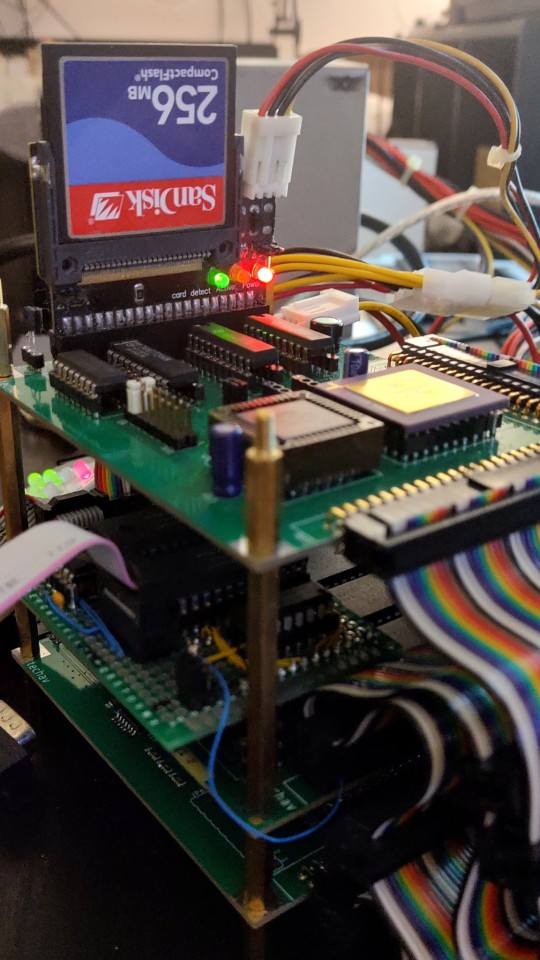
I have more ideas for projects than time or budget to work on them. Already this year I've gone completely through the design process for two new large homebrew projects that are currently too large for my project budget, plus a few small ones I never got around to ordering. So rather than spend more than I should taking on a new project, I decided to revisit an existing one.
It's been over a year since I last worked on the original Wrap030 project — my old stack-of-boards MC68030 system. Its current configuration includes the main board with CPU, ROM, RAM, UART, & glue logic; a hand-wired breakout board to add a second UART; a custom video output board; and a mezzanine board with FPU and provision for an IDE disk that is not yet working. It has been functional in this configuration since last February.
My goal for this project from the beginning was to build something capable of running a proper operating system, like Unix System V or Linux. To do that though, I'm going to need to get disk access working.
I had started on disk access, but didn't quite have it functional when I turned my focus to integrating all of boards into the single Wrap030-ATX motherboard. I had added IDE cycles to the CPLD on the mezzanine board, and had added a few rough drafts of disk functions to my ROM. I set the project aside when I realized my function for checking dish presence was reporting a disk was present when there wasn't one.
I have worked with IDE before — my original 68000 project had an IDE port on it. I had gotten that project to the point where I could read a sector of data from the disk, but never could wrap my head around how to actually navigate even a simple file system like FAT16. It was this code that I had adapted for Wrap030, so when it didn't work, I assumed it was a problem with my logic.
Turns out I had just inadvertently clobbered a register in the disk check function. The logic worked just fine. I was able to write a couple quick BASIC programs to read a sector of data and even run code from the boot sector.
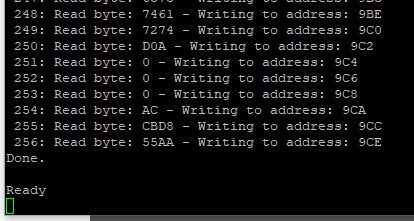

My assembly function for reading data from disk however was still not working.
I tried rewriting it.
I tried rewriting it in C instead of assembly.
I tried again, and again, and again. I added delays and loops and print statements and everything I could think of. I scoured datasheets, read though all the different release versions of the ATA specification, ported code from other projects, looked at every example of reading from an IDE disk I could find.
No matter what I did, I always got the same result.
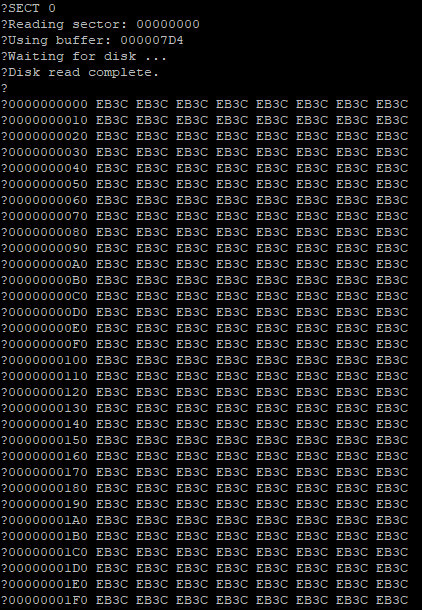
This did not make any sense. Reading from an IDE disk involves setting up the sector address, the number of sectors to transfer, sending a read command, and then reading the IDE data port 256 times per sector. Each time the data port is read, the disk will give another 16-bit word of data. But for some reason, all I was getting was the first word of data returned 256 times.
There is nothing in the specification to explain this.
I knew there was nothing wrong with my logic, because I could read the data just fine with my BASIC program or by manually poking the right addresses using the monitor. Maybe there was some edge case affecting timing when running in assembly, but even adding delay loops and print statements didn't have any effect.
I reached out for help. I got great feedback on my read functions and my timing and how IDE and CompactFlash cards worked, but still could not solve this problem.
But then @ZephyrZ80 noticed something —
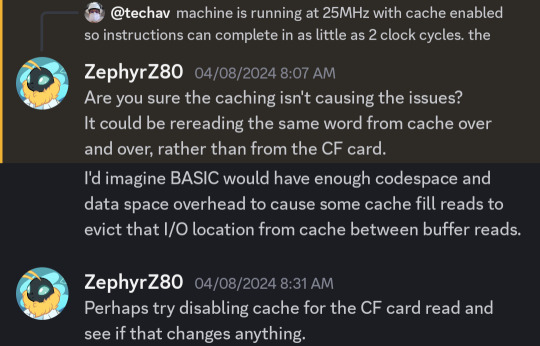
I had shared my code and was explaining that I had added some extra NOP instructions to enforce minimum time between IDE access cycles in PIO-0 mode. At 25MHz with cache enabled, the 68030 can complete an instruction in as little as 80ns, so a few NOPs would ensure enough time elapsed between cycles.
With cache enabled.
… cache enabled.
… cache.
The 68030 has 256 bytes of data cache. My disk read function is running in a tight loop that only really hits a few addresses; not nearly enough to invalidate and flush the entire 256 bytes of cache. The CPU does have a cache inhibit signal to use with peripherals that return new data on subsequent access to the same address, but it turns out I was only asserting it when accessing the UART on the main board.
It's a simple enough hypothesis to test. When I initially added support in my ROM for enabling cache at startup, I included user functions for enabling and disabling cache.
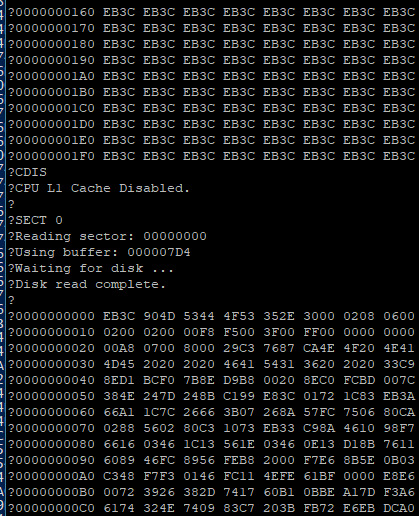
… It was cache all along.
Now I need to add some way to inhibit cache while accessing the IDE port, and then I can move on to trying to use the disk for loading programs.
37 notes
·
View notes
Note
i'm curious, do you have any romantic headcanon (or something cute or idk) of Indra? 👀👀
IN FACT, YES, I can talk about this man all day long, I never run out of ideas for him 😭💕I love to picture Indra as a father, it warms my heart.
I usually paint Indra as the worst villain and a terrible person in my works, but I also like to fantasize about a beautiful, human, real side of him🤗❣️
Here's a little bit of that, romanticism and cute stuff, Indra being a nice father and a good husband💫🙏

- Unexpected, but the best father of all Uchiha men. He grew up so lonely and abandoned by his parental figures that no matter how consumed he is by the curse of hatred, he has a special place in his heart for his children (and he has a lot of them, yes). People would think he is absent with his children, but he is in fact the mama bird of the relationship.
- His best way of showing trust is by allowing her to touch his hair. He has an intrinsic affectionate relationship with his mane, it is impossible for him to cut it or reduce its size because it has accompanied him during all his odysseys, it is his sign of power. Allowing (Y/N) to comb it, or make a braid, a ponytail, is because he genuinely trusts her.
- Special affection for animals. Who initiates the family cat tradition, and is personally in charge of feeding all the living beings he allows to inhabit his house. He has only one dog to symbolize the companion he lost as a child, but about eight cats mixed between nature and his home.
- He is the one who teaches his children how to take care of their hair. Having inherited his father's imposing hair, Indra himself is in charge of telling them how to wash it, comb it, and what styles to use for comfort and practicality.
- Every night and when the children are already asleep, he likes to sit on the engawa of his house facing the garden, and ask (Y/N) to sit between his legs resting her back against his chest. Staying in that position, for a good few minutes, brings him peace.
- Never having been able to express in words how he feels about her, he chooses to show her firsthand. He gives her a beautiful graphic explanation of everything he feels for her through his eyes, using his Sharingan to give concept and form to the beautiful things only she can make him experience.
- He is not a person of many words, but every time he comes across her at home during the day, he kisses the crown of her head, resting his cheek against her hair after a few seconds and closing his eyes, breathing in her perfume and recharging his energy.
- He only says I love you when he thinks (Y/N) is asleep. Indra finds it insanely hard to accept he is only human, that he feels, and hates it when people acknowledge him as such. Only when he thinks she cannot hear him is he can put into words what he feels, and (Y/N) always waits to hear him by pretending to sleep.
- His love language is giving gifts. Without affinity for the verbal part of the relationship, he decides to show how he feels with expensive things, clothes, jewelry, make-up, you name it. Sometimes, if he is in a good mood, he leaves a note with a heart drawn next to his gift, but he hopes (Y/N) won't comment on it.
- He is happy seeing her happy. After achieving his main goal and the reason his life functioned, he found that taking care of his wife's fulfillment gave him the same satisfaction as trying to destroy his brother. He focused 100% on her, and no matter how many children were in between, (Y/N) never ceased to be his priority.
- With their first born and in his first months of life he loved to have him sleep between the two of them. Indra would put him to bed between mom and dad, enveloping him in the presence of his parents and wanting him close at all times. He loves his babies sleeping on his chest too, good winter naps laying on daddy.
- He loves flowers, madly appreciates their beauty, and loves to gather a small sprig from the garden to leave on (Y/N)'s bedside table for her to see when she wakes up. Again, he hopes she doesn't thank him or comment on them, but simply sees them and thinks of him. He always makes sure to interchange types and colors so as never to repeat the same pattern of flower arrangement. With the arrival of his children, he has assistants assembling the perfect bouquet for mom.
- The best at singing lullabies. He doesn't remember where he got them from, but he knows so many bedtime songs there is no doubt who is in charge of putting the little ones to rest. His voice becomes extremely soft when it comes to them, and they fall asleep in a matter of minutes with daddy's voice.
- With his first child, he didn't sleep the first three nights of the baby's life, worried that something would happen to him while he was resting or that someone would steal him. He stood guard all night and took care of all the child's cries, Sharingan always active just in case any threat was near. Ultimately, after giving in to a full afternoon nap, he chooses to tuck him into bed with them both.
- He does not like (Y/N) to work or exert herself, always surrounding her with his best servants to ensure she has everything she needs and lacks nothing. If she refuses to receive assistance like royalty, he himself will do the chores so his wife won't lift a finger.
- He loves to cook. He refuses to have a personal chef, almost always taking care of all the day's dishes. On the nights they spend with (Y/N) for their dates, he is usually the one in charge of dinner, and if she wants him to not have to do anything, they go out to eat at some fine food stand.
- He loves all of his children, but his favorite is his little girl. The last of all to arrive is the one who steals his heart completely, his princess. He kills and hurts for anyone in his family, but this little girl has him in a chokehold. He fulfills her every whim without complaint.
- He always seeks intimacy with (Y/N), be it a small moment of the day or a night dedicated to themselves. Loves and needs her emotionally as well as physically, and always prioritizes adult time with no children around. He takes it upon himself to get a babysitter so he can shower his wife with quality time and good sex.
- He doesn't really know how to be romantic, but he tries by preparing special dinners with (Y/N's) favorite dishes and asking her how her day was after a tiring one. His love language consists of gestures and gifts, and he tries to make them present so that his wife never doubts his love.
- (Y/N) caught him several times telling the children about their uncle Ashura, what a good man he was, and the honorable way he fell in battle. He never mentions their fight or his family's conflict, and she assumes it is to preserve a favorable image of their uncle. Perhaps after his death, Indra made peace with his brother.
#indra otsutsuki x reader#otsutsuki indra x reader#indra x reader#indra otsutsuki#otsutsuki indra#indra#naruto shippuden#naruto imagines#naruto#uchiha clan#naruto x reader
94 notes
·
View notes
Text
THIS IS SO IMPORTANT GUYS!
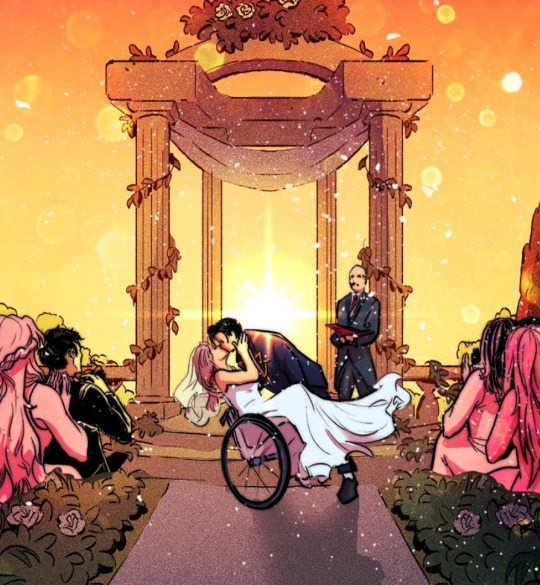
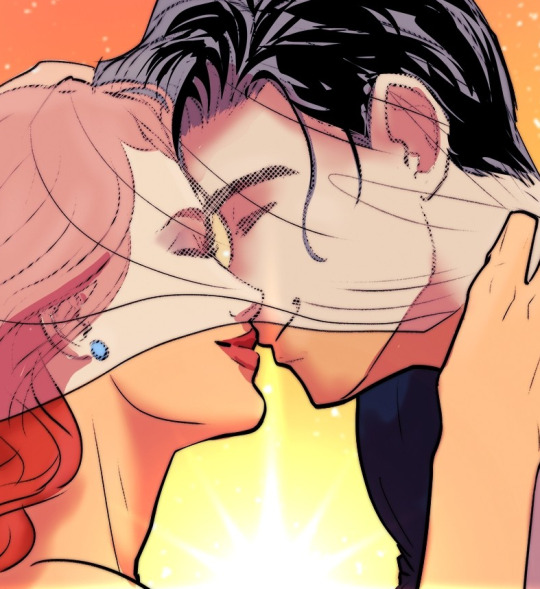
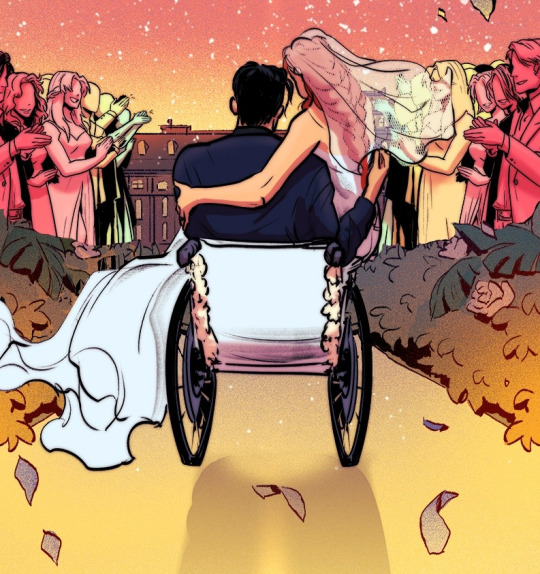
First and foremost, I have two confessions. One, I haven't read Red Hood: Outlaws WebToon. It's on my list, but I will admit that I'm missing context. Two, though I talk about disability, my main focus is physical walking disabilities. This commentary should apply to every physically disabled human being if I'm doing this correctly, but I chose to have a specific focus for the sake of brevity.
I'd have very few nickles if I could have one for every time I saw a wheelchair-dependent character get suddenly healed. But it's still too many nickels. I can't blame Marvel or DC for my poor relationship with my own mobility aids. It didn't help anything to see Barbara Gordon or Charles Xavier suddenly be able to walk after seeing them for so long in their wheelchairs. Recovery and recuperation should never be scoffed at. We should celebrate when we can accomplish difficult goals and be happy for others who achieve what they thought was impossible. But these characters' changes aren't about recuperation. They're about ignorance.
Recuperation doesn't always mean full recovery from the viewpoint of a disabled person. Sometimes, "walking quickly" or "standing independently" isn't the end goal. It's usually more complicated than that. Small things like strengthening the core or practicing distance walking in a walker are crucial for someone's health or mobility. If it means they can walk independently in the process, then cheers! But sometimes standing isn't a possibility anymore. Many able-bodied people, without this context, may perceive this attitude as "giving up." I've had to explain to several different people that my choosing my wheelchair over my crutches to be a more functional human is not the same thing as quitting. But society has a model for success, and that model has a healthy set of legs.
Growing up, it broke my heart when I saw a character who had to experience a permanent and life-altering disability being suddenly cured. That's not a story of recuperation. That's a writer trying to "fix" something that was "wrong". I don't think the writers mean that as an insult. It's a terrible trope that's rooted in ignorance. But that ignorance is commonplace. It makes self-acceptance all the more difficult for a person who doesn't have full use of their body. Instead of being a person in a room who happens to use a wheelchair, that person suddenly becomes a paria because they are "physically incorrect."
Barbara Gordon, still paralyzed, marrying Dick Grayson is important. In their most standard form, weddings are supposed to be beautiful and romantic. Most of us dream about being the most beautiful, best versions of ourselves that we've ever been for one of the most special days of our lives. Barbara was the best version of herself when her father wheeled her down the aisle. She was Batgirl and is now Oracle, but she never stopped being Barbara. She is loved by her father, her adopted family, and her husband. The saccharine nature of that scene had nothing to do with a disabled woman being loved by an able-bodied man. It was a sappy, beautiful wedding being celebrated by our favorite dysfunctional found family.
I'm honestly really excited to read this webtoon. It is about Jason Todd, but the care and respect Patrick R. Young shows in this scene and how well it was depicted by Nico Bascuñán says a lot about how they handle the rest of whatever story they tell in this comic.
#red hood outlaws#dc comics#superhero#batgirl#barbra gordon#dick grayson#nightwing#writing disability#disabled representation#disabled pride#disability#batfam#red hood#future hero theory#dickbabs
69 notes
·
View notes
Note
In defense of my pov and maybe I wasn't very clear in the ask... I do think the point of Itachi in the earlier arcs is that he is meant to come across as one dimensional (of course to writers and those who read a lot this actually should equal something potentially being incredibly fishy), so when we get the conspiracy reveal after his death I mean that I wasn't surprised there was more to it and I love how it threw every interpretation of his actions from beginning to end into a new light. (And I realize I forgot to fix a sentence and I love Itachi now, but when I first encountered naruto in my early teens, he honestly didn't scare me that much 😅, he comes into town, doesn't kill any of the main characters because that point in the story wouldn't have made sense for such a thing, and then he leaves, seemingly on a tactically considered whim which fits his characterization at that time)
I also think it's actually incredibly important that Orochimaru and Itachi are both meddling in Sasuke's lives at the same time, which is why I brought them up as a "comparison" even though their motives are never even remotely the same! Orochimaru is horrific as an individual and a villain, but from a narrative standpoint serves as an incredibly effective smokescreen. Orochimaru is an immediate threat from the moment he is introduced, he's a constant and threatening presence and Sasuke goes and exposes himself to that for years which leaves him very little time to introspect on the circumstances around his family's death.
Itachi on the other hand is more of a goal than a threat. He's dangerous, we see enough of him vs other cast members like Jiraiya and Kakashi for that, and he very badly wants Sasuke to pursue him (seen as early as the hotsprings town attack and later made abundantly clear to be because he wants Sasuke to spend his vengeance on him, although even that reasoning is multi layered). He's one of Sasuke's primary enemies, but he functions so differently from Orochimaru that the audience just sees him as a different kind of big bad is all.
(Sorry for the long explanation, I just don't want you to think I'm stupid 😅 but I also might be coming at my interpretations from a different place than you and that's fine too! I appreciate your first answer regardless and thank you for those panels! The manga is so long that I definitely forget things.)
For the purposes of my own work, I often think of how information is compartmentalized in the village... because other members of the konoha 11 also come to the conclusion Sasuke should be killed, but the tactical ones have different justifications than Sakura if I'm remembering correctly? I think they're mostly meant to parrot the village policies, esp since they're secondary characters at best, just cementing the way that villages sacrifice individual members for the sake of less war (which is different than real peace!), but it still makes for some interesting considerations of how much/what other characters know and where they get their information from.
Anyways, sorry again for the long ask but thank you for so much uchiha content!
Oh, of course. Initially, he is meant to be a one dimensional villain, and there are hints dropped to give him more nuance, which make sense after the truth reveal. When we move towards the chapters/episodes leading to his death, the story starts to explore his fragility while he's still a villain.
His reveal didn't surprise me. It devastated me. I've been one of those who had some gist of him not being evil, but the tragedy was entirely unexpected.
If you love Itachi too, then welcome to our hell because we suffer forever here, loving both the brothers.
Don't worry, I loved reading your interpretation of both Itachi and Orochimaru and their influence on Sasuke. Itachi is a big deal because even though Sasuke faces an actual threat from Orochimaru, he isn't scared of him. But whenever he sees Itachi, his reactions are always intense. And even after their battle, he was completely shaking, even if he knew Itachi would have exhausted his chakra too. The only person Sasuke was really scared of was probably Itachi. Other than Itachi being invincible, there were a lot of feelings. Itachi had been cruel to him. Not only physically or psychologically but also emotionally. The only one who could dismantle him was Itachi. And Sasuke had all the unanswered questions in his mind because from his POV, his beloved brother one day stopped loving him when he'd always been so supportive of him.
I think other Konoha Shinobi wanting to kill Sasuke is different from her wanting to kill Sasuke. They didn't love him, they didn't care about him, and that also includes Kakashi. She claimed to love him, and concluded that he needed to die for his own sake. I have no expectations from Konoha 11 and I don't care about their opinions on Sasuke either. But she married Sasuke and never bothered to know why he changed so suddenly and why he would want his brother back. Does she even know anything about the Uchiha clan and its history? And what happened with Itachi and all? Probably not.
Don't worry about the long ask. It's totally fine. Thank you. :)
#itachi#sasuke#uchiha brothers#anti sakura#anti sakura haruno#anti ss#anti sasusaku#i'm writing so much sakura slander nowadays it's crazy#ask
28 notes
·
View notes
Note
Hi :) I've noticed one of my main issues in writing is I don't use enough words, I don't want to go into elaborate detail of things that don't matter or use unnecessarily long words but I do want a decent word count on my book. Do you have any advice on this? Thank you in advance.
Struggling to Reach Desired Word Count
If you're struggling to reach your desired word count but feel your amount of description is good, odds are you simply don't have a plot that merits the word count you're trying to reach.
Different types of stories and different fiction genres have typical word count ranges. The exact ranges vary according to trend and source, but current ranges are generally:
Short Stories - 1,000 - 10,000 words
Novelette - 10,000 - 20,000 words
Novellas - 20,000 to 50,000 words
Novels - 50,000 - 130,000 words
Epic Novels - 130,000 words and up
Middle Grade novels - 25,000 - 50,000 words
Young Adult novels - 40,000 - 80,000 words
New Adult: 60,000 - 85,000 words
Adult: 80,000 - 110,000 words
Literary novels - 80,000 - 110,000 words
Romance novels - 50,000 - 90,000 words
Historical Fiction novels - 90,000 - 150,000 words
Fantasy novels - 90,000 - 150,000 words
Sci-Fi Novels - 90,000 - 150,000 words
Mystery novels - 70,000 - 90,000 words
Thriller - 70,000 - 90,000 words
So, the first step is to look and see where your story should be falling, and see how far away your story is from the bottom end of the range. Being slightly below the range isn't usually a huge deal. If you've written a romance novel that's 46,000 words, you're probably not going to be turned down for publishing because your story is 4k words under the lower end of the ballpark range. However, if your story is 28,000 words long, you would probably have difficulty finding a traditional publisher unless they specialized in novellas. Self-published books have some flexibility with range, though you still want to be mindful.
If the word count you're aiming for is logical and you're still falling short, and you feel your amount of description is fine, the next thing you need to look at is the story itself. Does your story have a conflict the protagonist or ensemble is trying to resolve? Do they have a solid goal they're trying to reach in order to resolve this conflict? Do they have an actionable plan and are you hitting all the relevant plot points? Do you have at least a couple interesting subplots that run parallel to the story but feed back into it again? If your story is fully or partially character-driven, do your main characters have satisfactory story arcs, and did you do the work to carry each character through their arc? For the important relationships that develop, did you do the work of showing how these relationships developed and how they function?
Beyond that, I would suggest looking at whether you're doing more telling than showing. In other words, do you find yourself writing things like, "Stella went outside after it rained and saw the moon shining," versus something like, "Stella crept outside and wandered down the lane, dodging puddles filled with water and moonlight." Showing, rather than telling, does tend to add words. Guide: Showing vs Telling
Finally, make sure you're exploring character thoughts and feelings, and using sensory details to bring the world around them, and the events they experience, into focus for the reader. Portraying Strong Emotions
•••••••••••••••••••••••••••••••••
I’ve been writing seriously for over 30 years and love to share what I’ve learned. Have a writing question? My inbox is always open!
Learn more about WQA
Visit my Master List of Top Posts
Go to ko-fi.com/wqa to buy me coffee or see my commissions
167 notes
·
View notes
Text
A Little Something [The Other Side] - AvA / AvM Fan-Made
I couldn't think of a title.
This one is a result of a poll where the majority of votes was getting nothing. So y'all get nothing. The story stops before anything even happens.
Also, Keep Reading for some lore drops.

Introducing vic's New Weapons
The white sphere is vic's Influence. It's his natural ability to recruit anyone into his inner circle. No one can resist it. Sure, it might take time on some sticks but everyone will always give in.
This is how he basically seduces A. He spams it a lot and A was telling him that he doesn't need to do that anymore because he's not going anywhere.
vic doesn't always use the Influence, though. The effectivity depends on whether he likes the stick in the first place. If he hates them, then he won't use it. The duration of the effect also depends on their compatibility.
The red cube is vic's Limit Breaker. After Rush Hour, King was hired at the Rocket Corp where he's given unlimited access to the all the toys (equipment) he wants as long as he helps The Monochromes make the Limit Breaker last longer.
It functions the same as The Box, with the core component being H's powers (will explain more about this in the future). It gives vic enhanced strength, but it only lasts for 12 seconds before breaking apart.
King, being the genius inventor that he is, did not only make it unbreakable, he also made it compatible with vic's Influence. So, now, everyone in vic's Inner Circle (basically, all his family and the mercs) are enhanced/protected, but the range is limited. So, he needs to be at the front lines to be actually useful.
The effects of the Limit Breaker also extends to vic's Clones. He can make clones naturally without the need for The Box. He mainly uses it to satisfy A, and not for combat. Once the Clones return to vic, all their memories, feelings, and experience (pain or pleasure) will play inside his head, one at a time. So, he's usually so out of it for an hour or so.
Each clone possesses one aspect of his personality, so they all talk differently from each other. They also have a mind of their own, but they rarely go against the main goal.
The Clones and vic are what I refer to as A's Harem.
Parody Weapons
These are weapons that are not canon to the plot of the AU, but he still uses them for roleplaying.
The Limit Breaker Staff - Developed by King, of course. It increases the range of vic's Influence and also enhances the effects of the Limit Breaker. He cannot use it on himself, so it's more of a Support weapon.
Smoke Bombs and the Holy Smoke Bomb - For running away from our problems and Bonus Holy Damage 'cause why not.
DIY Hammer - A large hammer for DIY, because he can be the man of the house too.
Cowboy Hat plus Lasso - Mainly for cosplay and character design. Not really a weapon. Perfect for covering your blushing face too.
Author's Note
I love drawing my characters in a 3D plane.
That thing is vic's fancy couch. I call it The Harem Couch ✨.
As for the other two options on the poll: An alternative story was that vic was supposed to give something to A, and the other is Kinky stuff.
Original character by Alan Becker
25 notes
·
View notes
Note
Hi! Can I order Yandere Alphabet Muzan? Thanks!
You didn't say which letters so I just chose the first four.
Tw: Yandere themes, unhealthy mindset, unhealthy relationship, possessive behavior, obsession, control, manipulation, gaslighting, mind games, violence, death, abduction, isolation
Yandere Alphabet

Affection-How and how often do they show affection?
🩸 Long story in short, you'll have to earn it. Muzan is never, never, a man who just gives someone something out of the amiableness. He wants to be worshipped by his darling, wants to be respected and feared by them. Nothing you get is for free, there is always a price to pay. In the case of his affection it's your own obedience and love, only then will Muzan mellow out enough to show you his own affection, otherwise he'd be too proud to dote on a human. There is the affection he gives merely to display you as his little pet which happens in rare cases where he takes you with him when he meets his Upper or Lower Moons where an arm holds you tightly or, in case he's sitting, your head is in his lap or you're completely placed on his lap. Physical affection isn't Muzan's man way of showing his affection though and it's safest to only do it when he's initiating it first since he might be displeased if you touch him without his allowance. His main ways are gifting you whatever someone could buy with money or quality time, idle times where he isn't as menacing as normally.
Blindness-How obvious are they to their feelings? Are they delusional?
🩸 Muzan views himself as the almost perfect being, he only has to find the Spider Lilly and then he'll have reached perfection. He's selfish and willing to do anything to satisfy his own desires. Whilst he probably knows that everyone else despises and fears him for the bloody meassurements he takes to reach his goal, he only cares about himself. Everything he does, he does for himself. Muzan is deceptive so he notices an interest before it can even fully escalate. Especially since he has never spared humans much thoughts, they're low creatures and only function as a source of food for him and his minions. They're below him. His pride tries at first to convince him that those feelings are nothing real, that there is a plain and forgettable reason why you stay on his mind. This short illusion lasts only short though before the demon realizes that you're permanently on his mind.
🩸 He could never see the blame in himself, could never acknowledge that he has fallen in love with a human at first. There's anger at first, anger directed at you before the slow acceptance settles in. As a man who sees himself as godlike, Muzan sees everything below him out of lack of respect and his own conviction that he's superior. This makes him a delusional and apathetic man. If he wants something, he never considers the feelings of others which is exactly the same with his darling. He desires you, you're on his mind so he'll just take you for himself. Muzan never considers you as an equal either due to his twisted view and expects you to take your place below him. You might be the dear and precious to him but you can never rise up to be an equal. In his eyes you will always remain as someone who is below him and should accept their place, should be grateful to be able to be with him at all.
Confession-How do they make their feelings visible? Would they ever confess and court their darling?
🩸 As mentioned before, his immense pride and his low opinion about humans in particular cause him to never show anyone his true feelings. It's shameful, embarrassing and above all it's humiliating and you can guess how that affects his mood. Muzan stays clearly away from you, something you might not even notice since you have never met this man before in your life. You're unsuspecting of the man who could kill you with such ease. Muzan might never reveal himself until you've already been kidnapped, an exception may be if he uses his disguise to mix with humans and you just happen to be someone he meets daily during that time.
🩸 Even then there are my serious doubts if he would actually go out his way to court his darling since Muzan is surprisingly impatient when it comes to the aspect of having his darling. He just wants to own them, he can always teach them later how to treat him with respect and adoration. Muzan is simply not someone who goes the first step of courting and admitting his feelings to you since in his opinion it's a clear display of weakness. Something he doesn't want anyone to see him as, including you. The only thing you might notice before the abduction is that Muzan is possessive, a displeased and scary look in his eyes if he ever catches you with someone else.
Death-How messy are they? Do they feel guilty/sorry for the lives they take?
🩸 Muzan is heartless when it comes to taming you into obedience and will be especially strong in gaslighting and blackmailing you and everyone you hold even the slightest bit close to your heart. He has no consideration for your own feelings and you learn to know that he is willing to let everyone get slaughtered if it serves to push you into the ideal obedient and good version of you he desires. Muzan isn't someone to dirty his hands that often himself though, he has demons all over Japan listening to his every word and demand and often considers lives not even worthy to take himself. Often he just orders one of his demons to kill someone for him. With you he might change that a bit though, mainly to show you what happens when you don't behave yourself. He lets a demon deliver the person to him and makes a little show out of it in front of you, chides you for not doing as you were supposed to do.
🩸 He harbors no guilt for the lives he takes and he has never done so in his entire life. In best cases he just sees humans as a nuisance. In your case he either kills humans who might have dared to try to charm you before you were abducted or people close to you to brutally teach you why you should head his every word or he kills demons without consideration if they tried to eat you. Demons are pawns easily replaced so he wastes no time with them, with humans it depends on how close you're to them since he might end up toying with them a bit only to see you begging on all four for his mercy. It's all a fruitless labor in the end though since he always slaughters everyone who is even a small thorn in his eyes.
177 notes
·
View notes
Text
Round 2, Match 63: Whitebeard vs. Otose
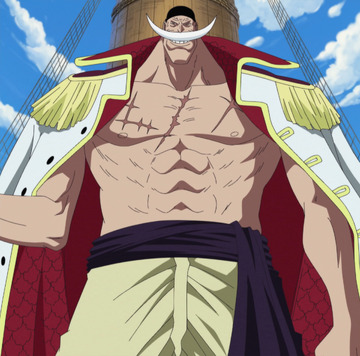
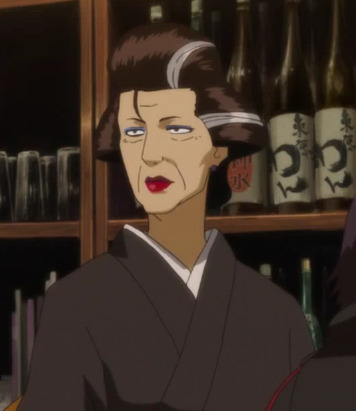
Submitted kids:
Whitebeard: Marco, Portgas D. Ace, Thatch, Izou, Haruta, Deuce, Jozu, Vista, and a bunch more I can’t think of rn
Otose: Sakata Gintoki, Catherine, Tama, and arguably most of Kabukicho
Propaganda under the cut!
Whitebeard:
1. “His reason for piracy was to start a family. He has so many kids who all call him dad. Found family to the max.”
2. “His biggest dream in life is to have a family of his own, but how to go about that? Settle down with a wife and have lots of kids? Boring. No, the best way to go about it is to become a pirate, find the most outcasted and lost people you can, and make them your crewmates/sons”
3. “His entire crew calls him pops because he takes them in and treats them like his children. He also likes to take into those who don’t have anyone else. His main goal in life was to have a big family that cared for each other so that’s what he made his crew.”
(Mod note: Full propaganda list coming soon!)
Otose:
“Okay so Otose is a middle aged to elderly woman who we are introduced to in the series as Gintoki’s landlady. However we later learn that when visiting her husband’s grave she found Gintoki, in his late teens having been discreetly released from the prison he was held in because the head executioner didn’t believe he deserved death. In exchange for being allied to eat the manju she wanted to offer her husband, Gintoki promised (her husband since it was his manju) to always protect Otose. She then took him, cleaned him up, helped him heal, and let’s him live with her. While she’s technically his landlady, Gintoki doesn’t pay rent, ever. To the extant that when his rival and him switch bodies, and said rival pays rent, she takes it as a sign of the apocalypse. Also I should note later arcs draw clear parallels between Gintoki and her husband And her other love interest, Jirochou, almost like he’s the kid they never had.
Catherine is introduced as a new employee of Otose’s, a middle aged woman who’s a dream employee right up until it’s revealed this is a con and she’s actually robbing Otose. Gintoki puts a stop to it, and Otose’s response it to, rehire her, realizing Catherine has no opportunities But crime otherwise. This creates an intense loyalty that while Catherine might bitch about, she once put her life on the line, telling her old crew she can’t do another job with them, leading them to try and beat her to death before Gintoki intervenes.
Then there’s Tama, a robot who began as a toy her creator made for his sick daughter, but as he kept improving upon her, eventually made her into a fully functioning android he essentially saw as his daughter. Then Tama is framed for murdering him, and then she learns he set it up to create a robot apocalypse. Afterwards Otose takes her in, and gives her a job working for her.
A final element of Otose’s adoptive nature is how she became one of the four devas of Kabukicho. The four devas are the most powerful people in Kabukicho and the other three are, a yakuza and former war hero/criminal, another former war hero/criminal who single handily took out fleets of enemies, and a former captain of the Harusame (space pirates). What did Otose do to join their ranks? Well she repeatedly helped people out when she didn’t have to, the repeated kindness she showed to everyone when they needed it meant that multiple residents were willing to put their lives on the line to defend her. Like it takes kidnapping the son of another deva and holding him hostage to get that fraction to turn on her.”
#one piece#one piece anime#whitebeard one piece#edward newgate#gintama#otose#serial adopters bracket#round 2#tumblr tournament#tumblr polls#mod note: the way this is set up looks like otose is judging his abs and I’m LIVING for that
17 notes
·
View notes